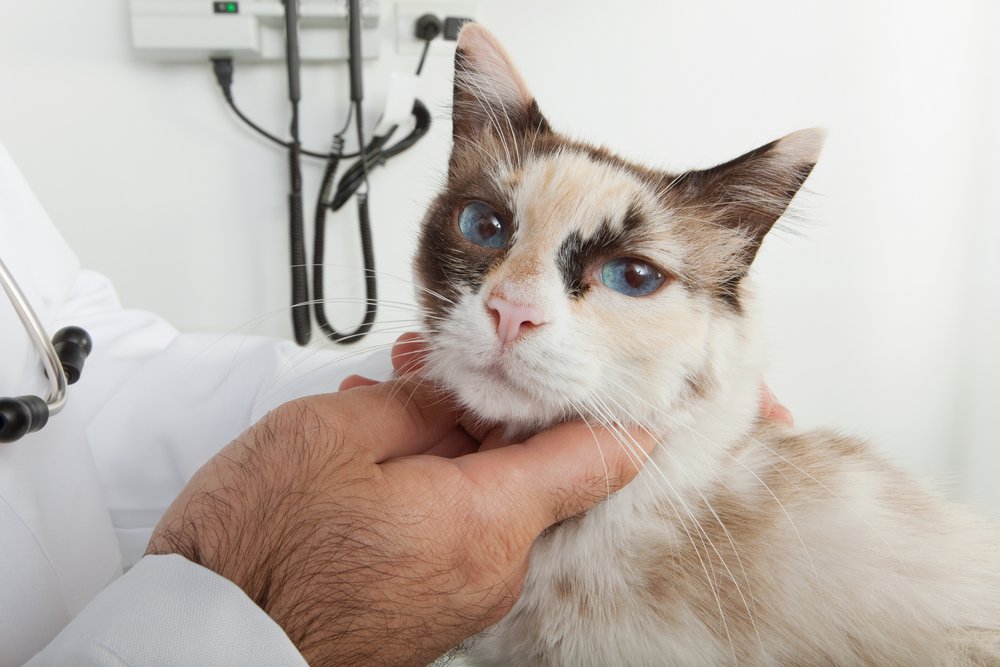Cats are known for their finicky eating habits, but when your cat has cancer, its dietary needs become even more important. Every pet parent wants to give their kids the best. While there is no one-size-fits-all diet for cats with cancer, there are some general guidelines you should follow to ensure that your cat gets the nutrients she needs.
Cats are carnivores. So raw meat is an obvious first choice. In the wild, the organs of the prey are preferred. If your cat will eat raw, then the food problem is solved. However domesticated felines, just like domesticated humans, have lost touch with their instincts. Domesticated cats are often finicky preferring denatured, vitamin-poor cardboard kibble loaded with soy and other nutritional toxins over the raw liver, heart, and other organ meats.
Over years of counseling food for cats with cancer, we have found that it is often more useful to describe what cats should not eat.
What to Avoid
- Prime Allergens (especially for animals with cancer and GI issues): Corn, wheat, chicken, and Soy.
- Some pets may be allergic to carrageenan and guar gum.
- No solicanins. Solanaceae is a plant family that produces toxic alkaloids. This plant family includes tomatoes, peppers, eggplants, and potatoes (not sweet potatoes). These are also known as nightshades.
- Dry Food: Unless dry food is all your pet will eat, avoid dry food because it dehydrates the animal and it’s over-processed. Freeze drying is recommended.
Recommended Foods
Types of Food: Freeze-dried is better than baked and baked is better than extruded. (If the package does not say baked or freeze-dried, it is extruded.) Canned is not so great either, Imagine yourself living out of cans! Canned and dry foods are devoid of enzymes and the proteins are denatured. These deficiencies can be remedied with supplements. The best food is raw food, but some domesticated animals cannot handle it.
Proteins
Of all the proteins, rabbit, lamb and venison are the best.
Limit variables by using “single protein, limited ingredient” foods.
How to Change Foods
All food changes should be done incrementally. A 10% change per day is recommended. If at any time the GI problems appear, then that food is not recommended.
Special diets to consider for cancer patients with multiple diseases :
Thyroid condition: avoid lamb, venison, and chicken as they are too hot by nature.
Hyperthyroid: duck, rabbit and pork are beneficial. Also, for hyperthyroid animals avoid seafood and supplemental iodine.
FIP: no pea protein. It can increase intestinal inflammation.
Kidney condition: avoid beef, buffalo, or Bison.(Too many inflammatory factors.) Glandular extracts are OK.
Super Carnivore Bone Broth Supplement
Bone broth can be purchased frozen, shelf-stable, and refrigerated, but the best bone broth is homemade. Although bone broth could be a staple food, it is time-consuming to make but can be effective in small doses. Give at least a few teaspoons for a 10 lb animal and a few ounces or more for a 100-pound animal.
Use a slow cooker that is very slow, so bones can cook for a couple of days.
Add:
5 lbs bones,
5 tablespoons Apple Cider Vinegar
Clean water that covers the bones
Cook on low setting for at least 48 hours. Stop when bones are brittle.
Things You Need To Understand About Cancer In Cats
- Cats frequently lose their appetite when they are unwell, therefore food intake may be used to assess their quality of life.
- When a cat is facing cancer, a proper and nutritional diet is essential. You can consider syringing food into your cat as a temporary emergency solution.
When trying to improve a cancer cat’s appetite, it is important to find anything “fixable” that might be affecting the cat’s willingness to consume food. Are there any medications the cat might be taking that might be affecting her appetite? Is it possible to stop using it or switch to another medication? Are there any alternatives for palliative treatment (surgery, pain relief, radiation therapy) to improve cats’ appetite even if they aren’t expected to cure cancer? It is better that she eat anything than nothing.
The next question is, ‘What are the best cancer fighting foods for cat patients?’ Cancerous cells change the metabolism of the body. They metabolize glucose to produce lactate, which the body then attempts to convert back to glucose. This diverts energy from the cat and redirects it to cancer cells. Cancerous cells also convert amino acids, which are the building blocks of protein, into energy, resulting in impaired immunological function, muscular atrophy, and sluggish recovery. On the other hand, these cells are not efficient in utilizing fat as an energy source.
How to Help Your Cat With Cancer Who Is Losing Appetite?
Are you worried if your cat has stopped eating anything after being diagnosed with cancer? It is quite possible that your cat may change their food preferences. It is also possible that they even lose their appetite completely. Here are some things that you can do to motivate your cat to eat:
- Sometimes giving them warm food is enough to make them hungry and eat food.
- You can add little water to the kibble. This small change can stimulate hunger in cats and will also ensure that they are hydrated.
- Add superfood, enzymes, and cancer supplements for cats in their food to stimulate appetite and also boost their immunity.
Supplements To Give Cats With Cancer & To Help Them Live Longer and Healthier Lives
Here are necessary supplements that can help your cats get treatment for cancer and help them live longer:
Probiotics: These are essential for cats’ health and they are effective in improving their immune system and the quality of their gut microbiome. They prevent and treat urinary tract infections, lymphoma, kidney problems, diarrhea, vomiting, and many other health diseases.
Fish Oil: Fish oil contains omega-3 fatty acids, which help shrink tumors and decrease inflammation. It also offers the added benefit of keeping your cat’s skin and coat healthy and lustrous.
Turmeric: Turmeric has several health advantages and includes curcumin as well as over two dozen anti-inflammatory chemicals. Curcumin, in reality, is an antioxidant that aids in the prevention of cell damage by reducing free radical activity in the body.
Celloquent Gold | Multi-Nutrient with Turmeric enhances the Celloquent formula with turmeric, Spirulina, and increased amounts of COQ10 and PQQ. Celloquent Gold supports the immune system of all animals. Celloquent Gold does this by boosting mitochondrial production and enhancing oxygen utilization which is especially critical for sick cats.
Super Food Supplement For Cats: The best way to improve the health and immunity of your cats is by adding superfood supplementation to their diet. Superfoods for cats include sulfur-bearing proteins (whey and colostrum) and necessary fatty acids (tuna oil). This cat food supplement boosts their energy level and also prolongs cats’ life.
This superfood cat can help your cat maintain blood sugar levels (chromium picolinate), treats allergies, and boosts homeostasis. It is also effective in enhancing oxygen utilization and immune competence.
Advanced Immune Restoration for Cats is a combination of three products that will help them fight against cancer. This is a holistic 3 Part program to support the immune system of cats with cancer. This Advanced Immune Restoration for Cats combo includes:
Herbal Anti: Herbal tincture (Venus Flytrap, Yucca, Licorice) for pain relief and appropriate inflammatory and immunological response.
Vital Pet Lipids: Quality fish oils, astaxanthin and vitamin E promote the overall health of the skin, joints, heart, and immune system.
Celloquent (16 ingredients): Increases mitochondrial synthesis, enhances oxygen usage, and aids in detoxification.
Conclusion
High-quality, targeted nutrition means the difference between life and death. Targeted natural products, such as astaxanthin, fish oil, PQQ, COQ10, and others mentioned in this article will support your cat’s immune system and reduce the side effects of chemotherapy, surgery and radiation!







Leave A Comment